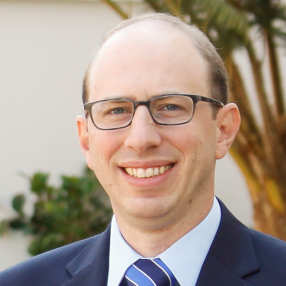Curriculum Vitae
B.A., Fordham University, 1999; M.T.S. (theology), University of Notre Dame, 2002; M.M.S. (medieval studies), University of Notre Dame, 2004; Ph.D., medieval studies, University of Notre Dame, 2010; Adjunct Instructor, Department of Philosophy, University of St. Thomas, 2010-2011; Tutor, Great Books Program, The College of Saint Mary Magdalen, 2011-2013; Visiting Scholar, School of Theology and Ministry, Boston College, 2012-2014; Lecturer, Department of Theology, Mount St. Mary’s University, 2015-2016; Tutor, Thomas Aquinas College, 2016-.
Profile
A native of Ohio, Dr. Drew Rosato studied philosophy and theology as an undergraduate at New York’s Fordham University. It was there that he “first had the opportunity to study the thought of St. Thomas Aquinas,” he says, giving rise to an intellectual curiosity that would eventually bring him to this college named for the Universal Doctor.
Upon graduating from Fordham, Dr. Rosato pursued graduate studies at the University of Notre Dame, where he earned a master’s in theology and a Ph.D. in medieval studies. There he made the acquaintance of his future wife, Jennifer, with whom he now has five children. He also met several graduates and others connected to Thomas Aquinas College, which led him to look into the College more deeply and, ultimately, inspired him to seek a position as a tutor.
“When I read the founding document of the College and came to understand its vision — and see that this vison took root in the way the school operated — that was very attractive,” he says. Having previously taught philosophy and theology at the College of Saint Mary Magdalen, the University of St. Thomas (Minnesota), and Mount St. Mary’s University, Dr. Rosato was also drawn by the prospect of teaching across the disciplines in the College’s classical curriculum. “The real coherence and integrity of the curriculum was a very big attraction for me,” he says.
Publications
-
“Necessity and Fittingness in the Soteriology of Peter of John Olivi,” in Soteriologie in der hochmittelalterlichen Theologie, Archa Verbi, Subsidia, vol. 19, ed. by David Olszynski and Ulli Roth (Münster: Aschendorff, 2021), 239-251.
-
The Passions of the Will and the Passion of Christ in Franciscan Theology from the Summa Halensis to Duns Scotus, in The Legacy of Early Franciscan Thought, ed. by Lydia Schumacher (Berlin: De Gruyter, 2021), 239-256.
-
“Anselm’s Influence on the Teaching of the Summa Halensis on Redemption,” in The Summa Halensis: Sources and Context, ed. Lydia Schumacher (Berlin: De Gruyter, 2020), 187-200.
-
Aquinas and Maritain on Whether Christ’s Habitual Grace Could Increase, Nova et Vetera 15 (2017): 527-546.
-
“The Teaching of Duns Scotus on whether only a God-man could make Satisfaction for Sin within the Context of Thirteenth-Century Franciscan Theology,” The Thomist, 79 (2015): 551-84.
-
“The Interpretation of Anselm’s Teaching on Christ’s Satisfaction for Sin in the Franciscan Tradition from Alexander of Hales to Duns Scotus,” Franciscan Studies 71 (2013): 411-44.








